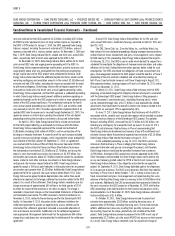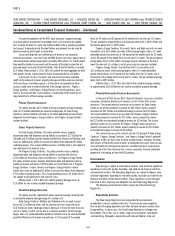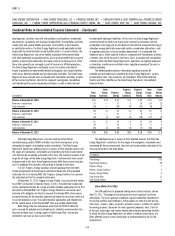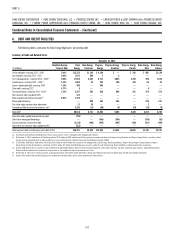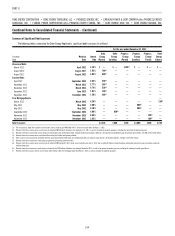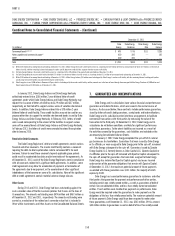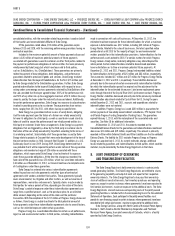Duke Energy 2012 Annual Report Download - page 169
Download and view the complete annual report
Please find page 169 of the 2012 Duke Energy annual report below. You can navigate through the pages in the report by either clicking on the pages listed below, or by using the keyword search tool below to find specific information within the annual report.
149
PART II
Combined Notes to Consolidated Financial Statements – (Continued)
DUKE ENERGY CORPORATION • DUKE ENERGY CAROLINAS, LLC • PROGRESS ENERGY, INC. • CAROLINA POWER & LIGHT COMPANY d/b/a PROGRESS ENERGY
CAROLINAS, INC. • FLORIDA POWER CORPORATION d/b/a PROGRESS ENERY FLORIDA, INC. • DUKE ENERGY OHIO, INC. • DUKE ENERGY INDIANA, INC.
$154 million paid into the registry of the court. Progress Energy was entitled to
a refund of the remainder of the funds. Progress Energy received and recorded
a $63 million pretax gain for the refund in December 2012. The gain was
recorded in Income from discontinued operations, net of tax in the Consolidated
Statements of Operations.
The case was remanded to the trial court to determine whether specifi c
performance is an appropriate remedy for the claims under the Asset Purchase
Agreement. The plaintiff seeks specifi c performance of an award of the
corporate interests in the Progress Affi liates it claims it was entitled to receive
under the Asset Purchase Agreement as of the date the jury determined the
breach of contract occurred (March 19, 2002). The Progress Affi liates contend
that specifi c performance is an inapplicable remedy.
In a second suit fi led in the Superior Court for Wake County, N.C., Progress
Synfuel Holdings, Inc. et al. v. U.S. Global, LLC (the North Carolina Global Case),
the Progress Affi liates seek declaratory relief consistent with our interpretation
of the Asset Purchase Agreement. Global was served with the North Carolina
Global Case on April 17, 2003. In May 2003, Global moved to dismiss the
North Carolina Global Case for lack of personal jurisdiction over Global. In the
alternative, Global requested that the court decline to exercise its discretion to
hear the Progress Affi liates’ declaratory judgment action. In August 2003, the
Wake County Superior Court denied Global’s motion to dismiss, but stayed the
North Carolina Global Case, pending the outcome of the Florida Global Case. The
Progress Affi liates appealed the superior court’s order staying the case. By order
dated September 7, 2004, the North Carolina Court of Appeals dismissed the
Progress Affi liates’ appeal. Based upon the verdict in the Florida Global Case,
Progress Energy anticipates dismissal of the North Carolina Global Case.
Progress Energy Carolinas and Progress Energy Florida
Spent Nuclear Fuel Matters.
Pursuant to the Nuclear Waste Policy Act of 1982, Progress Energy
Carolinas and Progress Energy Florida entered into contracts with the DOE under
which the DOE agreed to begin taking spent nuclear fuel by no later than January
31, 1998. All similarly situated utilities were required to sign the same Standard
Contract for Disposal of Spent Nuclear Fuel.
The DOE failed to begin taking spent nuclear fuel by January 31, 1998.
In January 2004, Progress Energy Carolinas and Progress Energy Florida fi led a
complaint in the U.S. Court of Federal Claims against the United States, claiming
that the DOE breached the standard contract and asserting damages incurred
through 2005. In 2011, the U.S. Court of Federal Claims issued a ruling to award
Progress Energy Carolinas substantially all their asserted damages. As a result,
Progress Energy Carolinas recorded the award as an offset for past spent fuel
storage costs incurred.
On December 12, 2011, Progress Energy Carolinas and Progress Energy
Florida fi led another complaint in the U.S. Court of Federal Claims against
the United States, claiming damages incurred from January 1, 2006 through
December 31, 2010. The damages stem from the same breach of contract
asserted in the previous litigation. On March 23, 2012, Progress Energy
Carolinas and Progress Energy Florida fi led their initial disclosure of $ 113 million
of damages with the U.S. Court of Federal Claims and the DOE. The total
amount of damages could change during discovery, which is set to end on
May 15, 2013. Progress Energy Carolinas and Progress Energy Florida may fi le
subsequent damage claims as they incur additional costs. A status conference
to discuss trial dates is scheduled for May 10, 2013. Progress Energy Carolinas
and Progress Energy Florida cannot predict the outcome of this matter.
Duke Energy Ohio
Antitrust Lawsuit.
In January 2008, four plaintiffs, including individual, industrial and
nonprofi t customers, fi led a lawsuit against Duke Energy Ohio in federal court
in the Southern District of Ohio. Plaintiffs alleged that Duke Energy Ohio (then
The Cincinnati Gas & Electric Company), conspired to provide inequitable
and unfair price advantages for certain large business consumers by entering
into non-public option agreements with such consumers in exchange for their
withdrawal of challenges to Duke Energy Ohio’s pending Rate Stabilization Plan
(RSP), which was implemented in early 2005. On March 31, 2009, the District
Court granted Duke Energy Ohio’s motion to dismiss. Plaintiffs fi led a motion to
alter or set aside the judgment, which was denied by an order dated March 31,
2010. In April 2010, the plaintiffs fi led their appeal of that order with the U.S.
Court of Appeals for the Sixth Circuit, which heard argument on that appeal on
January 11, 2012. On June 4, 2012, the Sixth Circuit Court of Appeals reversed
the district court’s decision and remanded the matter on all claims for trial on
the merits and on July 25, 2012, the Court denied Duke Energy Ohio’s petition
for an en banc review of the case. On October 15, 2012, Duke Energy fi led a
petition for certiorari to the United States Supreme Court, which was denied on
January 14, 2013. The plaintiffs’ January 2013 mediation demand was for $160
million. It is not possible to predict at this time whether Duke Energy Ohio will
incur any liability or to estimate the damages, if any, that may be incurred in
connection with this lawsuit.
Asbestos-related Injuries and Damages Claims.
Duke Energy Ohio has been named as a defendant or co-defendant in
lawsuits related to asbestos at its electric generating stations. The impact on
Duke Energy Ohio’s consolidated results of operations, cash fl ows or fi nancial
position of these cases to date has not been material. Based on estimates under
varying assumptions concerning uncertainties, such as, among others: (i) the
number of contractors potentially exposed to asbestos during construction or
maintenance of Duke Energy Ohio generating plants; (ii) the possible incidence
of various illnesses among exposed workers, and (iii) the potential settlement
costs without federal or other legislation that addresses asbestos tort actions,
Duke Energy Ohio estimates that the range of reasonably possible exposure
in existing and future suits over the foreseeable future is not material. This
estimated range of exposure may change as additional settlements occur and
claims are made and more case law is established.
Other Litigation and Legal Proceedings
The Duke Energy Registrants are involved in other legal, tax and regulatory
proceedings arising in the ordinary course of business, some of which involve
substantial amounts. Management believes that the fi nal disposition of these
proceedings will not have a material effect on its consolidated results of
operations, cash fl ows or fi nancial position.
The Duke Energy Registrants expense legal costs related to the defense of
loss contingencies as incurred.
The Duke Energy Registrants have exposure to certain legal matters that
are described herein. The Duke Energy Registrants have recorded reserves
for these proceedings and exposures as presented in the table below. These
reserves represent management’s best estimate of probable loss as defi ned in
the accounting guidance for contingencies. The estimated reasonably possible
range of loss for non-asbestos related matters in excess of the recorded
reserves is not material. Duke Energy Carolinas has insurance coverage for
certain of these losses incurred as presented in the table below.


